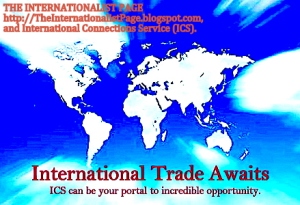When I was very young, and dinosaurs roamed the Earth, a smart fellow in a pin-striped suit told me this: " Boy...If you owe the bank a hundred thousand dollars, you're in trouble; but if you owe a bank several billion dollars, they're in trouble." Then he walked off, puffing on his cigar and glancing quickly at his pocket watch.
He was quite right. Right now the United States' two largest creditors, respectively are China and Japan. Yes, the U.S is a debtor nation. Yes, the Chinese (in particular) hold a great deal of debt denominated in U.S Dollars.
Instead of creating a problem, in the most real terms, it creates an increasingly growing area of intersection common interests. Putting aside pride and politics, the Chinese don't want to lose money on their investment in U.S debt so they have to measure that factor into every foreign policy move that they make in dealing with the United States. If our economy suffers, we cannot consume their goods, and their holding of U.S. debt further decline in value.
This indebtedness is (no pun intended) a bond which actually ties us together. It's the flip side of the ages old 'Mutually Assured Destruction' Mexican standoff paradigm that has kept large nuclear-strike capable nations from launching warheads at each other. It simply doesn't make sense when you think about it socioeconomically instead of emotionally.
Readers of The Internationalist Page Blog: Great Indebtedness To A Small Group Of Creditors Has Them Just As Worried About You As You Are About Them. The U.S. is in an awkward partnership with China and Japan. Indeed.
I would like to share an article with you which appears here courtesy of Yahoo Finance's Daily Ticker. It is informative, but it speaks of a peril that is much more emotional than actual:
As the U.S. continues to rack up more than $1 trillion of new debt
every year, Americans are beginning to worry about who we owe this money
to and how much power our creditors have over us.
According to Barry P. Bosworth, a senior fellow at the Brookings Institution, our two biggest foreign creditors are Japan and China.
Although it may seem as though our debt to these countries renders us a puppet on strings, Bosworth says this fear is overblown. The U.S. market is very important to China's economy, so China would be loathe to do anything that might exacerbate tensions or disrupt trade between the two countries. And the same can be said for Japan. China owns $1.15 trillion of U.S. government debt -- more than any other country -- but U.S. taxpayers actually owe less money to China compared to recent years. China holds 10% of U.S. Treasuries, down from 12% two years ago.
Related: China's Slow Growth 'Marks An End of an Era' But No Hard Landing
And what about all the anti-China rhetoric that we hear about on the campaign trail?
Republican Presidential Nominee Mitt Romney has been promising the country that he will declare China a "currency manipulator" on the first day of his presidency--and then enact tariffs as necessary until he forces China to level the trading playing field. Is that something that Romney is actually likely to do if he gets elected?
No, says Bosworth.
Tough talk with respect to China has become standard rhetoric for any presidential challenger. If and when Romney becomes president, his position will likely mellow.
Bosworth also says that the problem with the U.S.-China trade relationship is not, as is commonly believed, that China doesn't play fair. China has actually addressed lots of its unfair practices over the past decade, Bosworth says, while the U.S. is still pursuing the same old self-destructive habits. Until we stop consuming so much and start producing more, Bosworth says, we're in no position to demand anything.
---------------
According to Barry P. Bosworth, a senior fellow at the Brookings Institution, our two biggest foreign creditors are Japan and China.
Although it may seem as though our debt to these countries renders us a puppet on strings, Bosworth says this fear is overblown. The U.S. market is very important to China's economy, so China would be loathe to do anything that might exacerbate tensions or disrupt trade between the two countries. And the same can be said for Japan. China owns $1.15 trillion of U.S. government debt -- more than any other country -- but U.S. taxpayers actually owe less money to China compared to recent years. China holds 10% of U.S. Treasuries, down from 12% two years ago.
Related: China's Slow Growth 'Marks An End of an Era' But No Hard Landing
And what about all the anti-China rhetoric that we hear about on the campaign trail?
Republican Presidential Nominee Mitt Romney has been promising the country that he will declare China a "currency manipulator" on the first day of his presidency--and then enact tariffs as necessary until he forces China to level the trading playing field. Is that something that Romney is actually likely to do if he gets elected?
No, says Bosworth.
Tough talk with respect to China has become standard rhetoric for any presidential challenger. If and when Romney becomes president, his position will likely mellow.
Bosworth also says that the problem with the U.S.-China trade relationship is not, as is commonly believed, that China doesn't play fair. China has actually addressed lots of its unfair practices over the past decade, Bosworth says, while the U.S. is still pursuing the same old self-destructive habits. Until we stop consuming so much and start producing more, Bosworth says, we're in no position to demand anything.
---------------
Douglas E. Castle for The Internationalist Page Blog, The Global Futurist Blog and The Mad Marketing Tactics Blog.









No comments:
Post a Comment